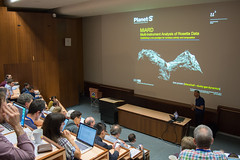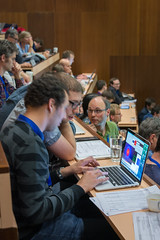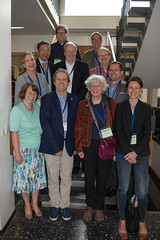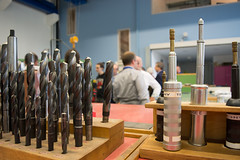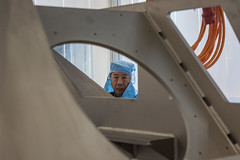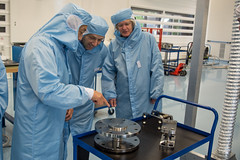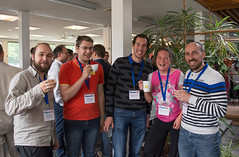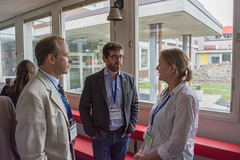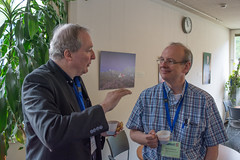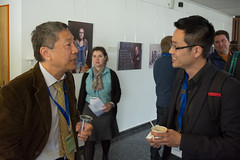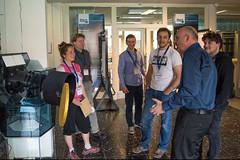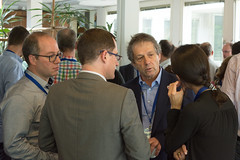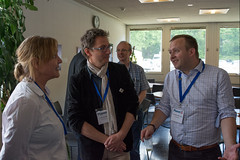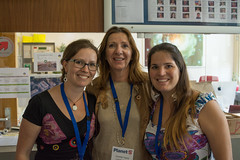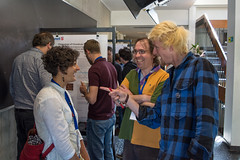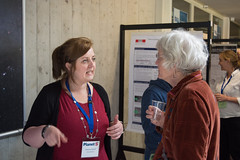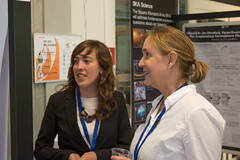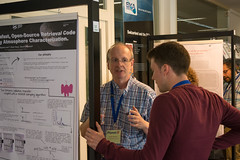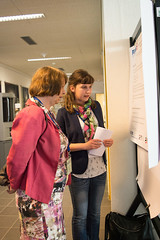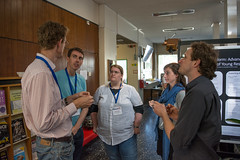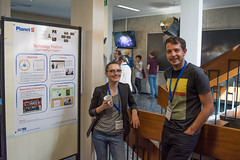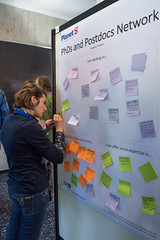Top Marks for PlanetS
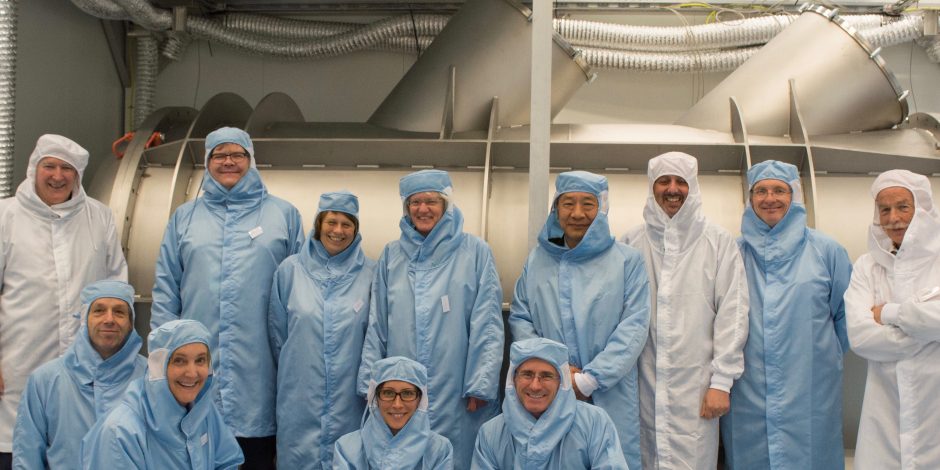
Once a year renowned experts evaluate the scientific quality and the progress made in every Swiss National Centre of Competence in Research (NCCR). After a two-day exam at the end of May at the Geneva Observatory the review panel was highly impressed by the activities of the NCCR PlanetS.
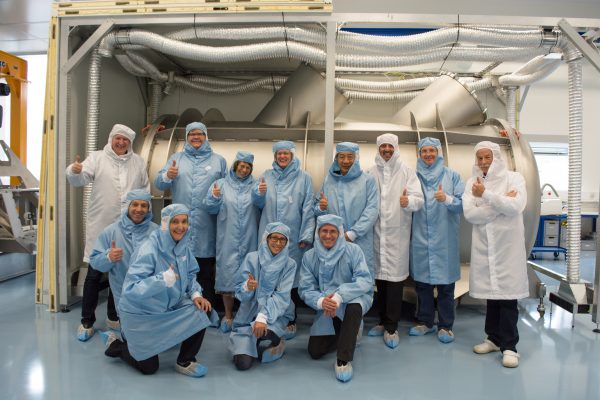
Members of the review panel and PlanetS visit the new clean room at the Geneva Observatory. (Photo: Guido Schwarz)
The yearly site visit of the international review panel is a special exam for the professors, postdocs and graduate students involved in the NCCR. You can feel the tension days ahead when everybody still works on his or her presentation or poster and tries to figure out in advance what kind of questions the experts could ask. The panel appointed by the Swiss National Science Foundation (SNSF) consists of renowned scientists. “We are looking for experts all over the world that are not involved in the projects of the NCCR and are not collaborating with NCCR researchers”, says SNSF officer Thomas Griessen.
Although spotting independent experts may be tricky in research fields with big international collaborations such as observational astronomy (or particle physics), the queried scientists usually are pleased to accept the appointment in Switzerland. “It is a good opportunity for them to get to know other projects and to discuss with colleagues in the panel”, explains Thomas Griessen. “I consider it as a service to the science community, and it is really exciting to see the range of high quality research going on”, says Larry Nittler, member of the PlanetS review panel and professor at the Carnegie Institution of Washington. Like most of his colleagues he flew just for the site visit to Switzerland and returned home immediately after, “so the jet lag can’t catch up with me,” he explains.
“I was surprised that the site visit takes place every year”, says panel member Ewine van Dishoeck, professor at Leiden Observatory at Leiden University. “In the Netherlands we have something called NOVA, a collaboration between the astronomical institutes of four universities, but we have to write reports only every three to four years.” Thomas Griessen explains the Swiss method: “Since establishing a new NCCR involves considerable expenditure, the SNSF wants to make sure that problems are recognised and solved at an early stage before a centre threatens to fail.”
There was no mention of failing at the PlanetS second site visit – on the contrary. “It is great fun to see how well it works”, said Debra Fischer, professor at Yale University in New Haven, US. While the panel’s detailed written report is expected for mid-July, Debra Fischer orally presented the preliminary conclusions at the end of the visit: “I think that the NCCR PlanetS is an extremely powerful institution, a game changer internationally.”
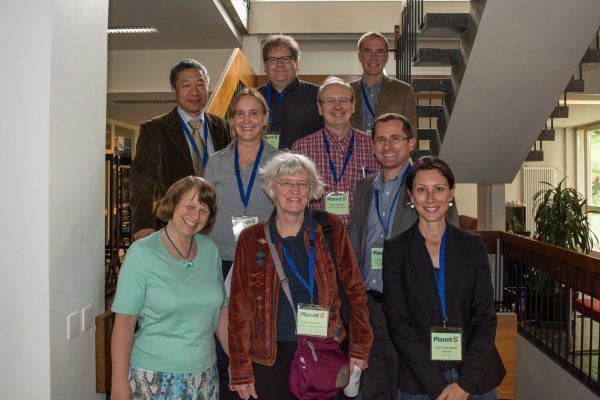
The review panel of the NCCR PlanetS: Front (f.l.t.r.): Prof. Ewine F. van Dishoeck, Sterrewacht Leiden, NL, Prof. Imke de Pater, Department of Astronomy, University of California at Berkeley, US, Prof. Anna Fontcuberta i Morral, SNSF, Abteilung Programme, EPF Lausanne
Middle: Prof. Debra Fischer, Department of Astronomy, Yale University, New Haven, US, Prof. Jamie Gilmour, School of Earth etc Sciences, The University of Manchester, UK, Prof. Frank Scheffold (Chair), SNSF, Abteilung Programme, Universität Freiburg
Back: Prof. Douglas N C Lin, Astronomy & Astrophysics Department, UC Santa Cruz, US, Prof. Larry R. Nittler, Department of Terrestrial Magnetism, Carnegie Institution of Washington, US, Prof. Simon Lilly, SNSF, Abteilung Mathematik, Natur- und Ingenieurwissenschaften, ETH Zürich (Photo: Guido Schwarz)
Whereas last year at the first site visit the different research projects had just began with their own work, this year they could present a variety of interactions between them and the different institutions in Bern, Geneva and Zurich. For example, in one of the seven PlanetS projects Maria Schönbächler and her team analyse meteorites. “Cosmochemistry provides ‘ground truth’ for planet formation models and is thus important for understanding exoplanets,” the professor at ETH Zurich explained. Therefore, she established strong links to two other PlanetS projects in Bern and Zurich. But also DACE, the Data and Analysis Centre for Exoplanets, at the Geneva Observatory, described as “magical” by panel members, connects many of the different research efforts and has even started to reach out. “Several Middle school and High school students used DACE during short term internship or in classes to discover exoplanets in our astronomical data”, said the DACE project scientist Damien Ségransan. Among the many highlights presented to the review panel was CaSSIS, the Colour and Stereo Surface Imaging System, that is on the way to Mars aboard ESA’s Trace Gas Orbiter. “It will be the best stereo camera flying around Mars”, Nicolas Thomas, professor at the University of Bern proudly stated.
“You made absolutely inspiring progress,” Debra Fischer concluded. But the panel was also pleased that its recommendations of last year’s first site visit were considered. For example, to further advance women in science the academic platform of PlanetS initiated an equal opportunity hiring subsidy paying for up to 50% of the salary of newly assigned female PhD students or postdocs whereas the outreach platform launched a PlanetS Facebook page to strengthen its social media activities. “The NCCR PlanetS is a model how science can be done combining research, education and outreach,” Debra Fischer said.
It was obvious that the NCCR board members were very pleased about the high marks given by the international expert panel. “Your comments are very important,“ said Stéphane Udry, co-director of PlanetS: “We need a broad view going over the purely scientific aspects. It is crucial for us, for the SNSF and for our supportive host institutions as well to get this feedback on our scientific and organisational priorities in order to help us shape the long term evolution of our initiative.” (bva)
